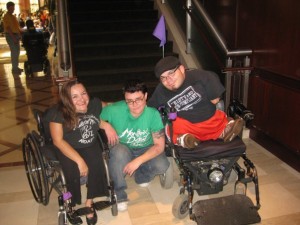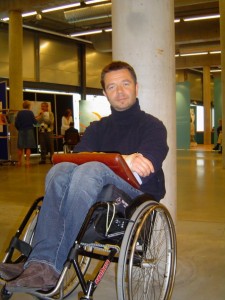This is a repost of an interview of me done by the delicious Philosopher Crip (aka Joe). He’s a great disability scholar-activist comrade who was open to me sharing this on my blog. Please use this as your catalyst to check out his thoughts. He’s brilliant!
Joe: I like the ring of your blog name, tell me more. What and why are you “confessing” and who is your confessor?
Bethany: I may as well start this sexy interview with a confession: I’m a nerd and proud of it. I LOVE alliterations and have embraced the label ‘crip.’ It signals disability pride and serves as a fun verbal slap on the face of the ableist world. Thus I needed a hot word to that started with ‘c’ in my title to satiate my need for mental masturbation.
Additionally, the overall purpose of my blog is to provide a platform for me to confess (i.e. share ideas that are traditionally not voiced) thoughts that I feel like disabled people just aren’t talking about publically, such as internalized ableism, the meanings of dating a nondisabled person, etc. I want to confess my truth because I think it can be a healthy catalyst for a communicative revolution. It is time we at least talk about these things with each other. I feel like here is a political impetus to be silent about some of the frustrating and painful aspects of disability, as we are all supposed to be pushing a disability positive narrative. Frankly, I feel that approach is not emotionally honest and actually can do us more harm than good.
Joe: What moved you to start a blog? What do you hope to accomplish with it?
Bethany: A noticed a disability blog carnival coming up on relationships and wanted to write something about my thoughts on my relationship. Being in a relationship with a nondisabled person has caused me to really think a lot of the desirability of my body and my ability to care. I wanted to share these thoughts with other disabled people in hopes of getting a conversation started on the topic. That’s one of my favorite things about social media – I can connect to a larger community of crips than those in my area. I feel connected to my people and thrive on that.
Also, I have been reading and thinking about the role of social media in translating research findings into mainstream culture. As a scholar-activist, I need to be intellectually rigorous but I also need to transmit these ideas to larger culture in order to try to create substantive social change. I see blogging, tweeting and Facebooking as wonderful outlets to help realize this desire. I have also decided I want to get into film making – because I realized if I disdain most representations of disabled people, why shouldn’t I create the media I want to see?
As I have said, I would like my blog to be a communicative catalyst to get people talking about things that we shy away from. I feel like confessing my truth – and thereby rendering myself really vulnerable publicly – can provide space for others to do the same. Through telling my truth, it may make it easier for others to be emotionally naked because we would all know we are not alone.
Joe: Talking about accomplishments, what kind of work do you do when you aren’t blogging? How do you see CripConfessions.com fitting in with the rest of your work in the disability community?
Bethany: I’m a trained lawyer and a sexologist. At the moment, I am clinical professor and policy analyst in the Center for Leadership in Disability at Georgia State University. I teach some classes, capacity build with our community partners, host events, and advise a disability student group on campus. I diligently strive to infuse everything I do with radical crip politics so that I remain true to my life purpose – the social amelioration of people with disabilities. When I was 20 I decided to devote my life to disability and I am sticking with that.
CripConfeesions fits into my overall work because I am devoted to raising awareness and creating social change for disabled people. Through blog posting, I hope to add to my other work by providing a personal glimpse into my nuanced reality. I want more people to understand that disability is not a personal tragedy, but is an artful way of being. Of course, as a sexologist, I also want people to see disabled people as desirable and viable sexual/love partners so I hope some of my posts make some people realize how deliciously sexy disabled people are. CripConfessions then is just one part of the overall revolution of consciousness I seek to be a part of.
And it’s really exciting that we are building a community of young scholar-activists. We are the upcoming leaders of our movement and I think it’s really beautiful that we support each other and our work. We need each other!

Joe: Like myself, I have always thought of you as someone that fancies herself to be both a scholar and an activist. Do these roles ever come into conflict for you? Do you ever experience any dissonance when trying to work in two arenas with such different cultures and sets of values?
Bethany: You’re right; I’m a scholar-activist. The roles do conflict at times because my radical politics do not always feel satisfied in the work place. People do not want to hear about privilege and power at work; they want to do their jobs to get paid so they can live. But as an activist I can’t and won’t silence myself, sometimes to the determent of my mental health. A colleague recently told me that it must be exhausting to constantly view the world as animus filled against certain people and he is right – but that will not stop me. More people need to be critically conscious about their realities and I think it could be even more emotionally exhausting if I were silent about the issues I care most about.
Also, though the complaint has been levied by many people – it’s worth repeating: the academic world is not accessible to most people and some of the revolutionary ideas that are created in the ivory tower never reach the masses. I want to marry these two things. I want what I write and think about academically to become reality. This is why I have tried to work toward making my work more accessible; blogging has really helped me in this shift. I want to change the world not just publish or perish.
Joe: Why have you chosen to do both? Couldn’t such tension and conflicts be avoided by doing just one or the other? Is this a matter of personal life satisfaction or is it that you think your work is better served?
Bethany: Sure tension could be avoided if I would just shut-up and consent to being a cog in the interlocking systems of oppression that screw over countless people. I could have been a lawyer – slaving away at a job that means nothing to me for good pay but I would have hated myself and my life. I cannot live my life in a way that is not true to my crip ethos. It took years to be able to look in the mirror without cringing at my disabled body and I want to do everything I can to change social views of disability so people do not have to go through the self-loathing that I and so many of my comrades go through.
And honestly, the grappling of tension in my roles is good fodder for debates and adding nuance to my arguments – which is intellectually orgasmic! Being a person with multiple locations/identities and passions is the kind of human I want to be. It’s really the only way I know how to live.
Joe: A lot of folks that work in the disability community seem to have their niche passions and while I have met a few people really interested in the intersections of disability and sexuality, none have really made it into their life’s work, like you are. What’s the deal here? Why is crip sex so important to you personally and professionally?
Bethany: On a very base, primal level, I confess, I am a hedonist; I love pleasure.
But on a deeper level, I experienced a confluence of a few really pivotal things that shifted my life focus to sexuality. In 2005, I was in law school and with every passing day there, I lost faith in the law to create social change (the reason I went to law school in the first place). That spring I hosted a conference about sexuality and disability. It was the crowning achievement of the many events I hosted at the University of Florida because it ROCKED the campus! I brought together some really amazing people including artist/activist Sunny Taylor, motivational speaker Greg Smith, crip sexologist (and my mentor) Dr. Mitchell Tepper, and former adult film-star Bridget the Midget Powerz. I was right in thinking a former porn star would attract a crowd, even for a disability focused event. We had a great turn-out for the event despite the downpour of rain and we addressed some serious issues of internalized shame, feeling undesirable and discovering sexual pleasure. In the process, I learned how comfortable I am with talking about sexuality and that it is a real professional asset. The whole experience was really profound and the after-party was one of the best parties I have EVER been to 🙂
Less than a month later, I lost the first man I ever loved to suicide. Karl was a beautiful Norwegian that I met at a Rehabilitation International conference in Oslo. We shared views on disability pride, using the media as a tool for social change, among other similarities. I adored the man and spoke to him via phone and email as often as I could. We spoke of me moving to Norway after completing law school – and despite my serious weather bigotry (I’m a Florida girl), I was ready to move just to love him.
One morning he called me around 5 am to confess to me something he had struggled with telling me since we meet a year earlier. He explained he could not achieve and maintain an erection, stemming from his spinal cord injury he incurred 16 years before his confession to me. I explained to him that his penis was not what attracted me to him, that sex was bigger than a penis and that he could give and receive a lot of sexual pleasure. But my words did not meet him. That was the last we talked. I learned from his sister about a month later that he had hanged himself. It was one of the most devastating periods in my life and I credit my friends for keeping me alive. I struggled to eat during that period as I just did not want to take care of myself. I cried and felt purposeless for months.
I realized in the grieving process that I was not just mourning Karl’s death – but I was mourning all the other disabled people who suffer in silence over the issues of sexuality. I vowed then to devote my life to changing the conception of crip sexuality so that other people would not hurt the way Karl did.
This gets to the point of the importance of confessing; if Karl had confessed his pain sooner perhaps he could have processed it instead of ending his life.


